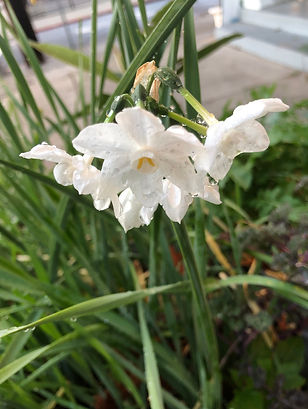


Contact Us: 310.399.1631
235 Hill Street, Santa Monica
Built on a progressive past, forging a just and inclusive future. Hosted by the United Methodist Church



The RainShadow Garden:
Playing a small but meaningful role in the fight against climate change.
By J.E. Monteagle
While Jane (a.k.a. CompostMama) of Growing Hope Gardens, is not the first to steward the garden at the Church of Ocean Park, she anticipates being the last.
By using biological and regenerative methods
that emulate Mother Nature, Jane is working
to wild the postage sized garden dubbed
“RainShadow” into a food forest that requires
a minimum of human interference.
This ambitious project of transforming a
small urban space into a thriving, edible oasis
offers many benefits to the environment and
the local community, such as:
By growing a diversity of flowering and
fruiting species that attract pollinators like bees, butterflies, and hummingbirds, RainShadow becomes a vital habitat for wildlife within the urban landscape. Increased biodiversity not only supports the overall health of the ecosystem but also creates a more balanced, resilient environment that better withstands the pressures of urbanization.
The increased vegetation works to filter airborne pollutants and absorb carbon dioxide, while releasing oxygen through the process of photosynthesis. By contributing to cleaner air, RainShadow helps mitigate adverse health effects associated with air pollution, such as respiratory issues and cardiovascular problems.
Wilding the garden patch plays a crucial role in reducing the urban heat island effect. When concrete and asphalt surfaces absorb and re-radiate heat, urban areas become significantly warmer than their rural surroundings. By increasing the amount
of greenery within the urban environment,
Jane's project helps to lower local temperatures
through the cooling effects of shade and
evapotranspiration, making the area more
comfortable for residents and visitors alike.
RainShadow’s increased vegetation and
healthy soil adds to the absorption and
filtration of rainwater. This natural approach
to stormwater management helps prevent
flooding while protecting local waterways from
pollution.
An essential element of the garden’s biological and regenerative methods is the development of healthy, nutrient-rich soil. By using only composting and other regenerative methods, Jane fosters a thriving underground ecosystem teeming with beneficial microorganisms. This healthy soil not only supports plant growth but also helps to sequester carbon, playing a small but meaningful role in the fight against climate change.
Especially significant, too, is the positive
impact the garden has on the local
community's mental and physical well-being.
Studies have shown that access to green spaces
can reduce stress, increase feelings of
happiness, and promote relaxation. In the
three years Jane has been developing
RainShadow, appreciative feedback, plant
donations, and offers of help, from passersby
to friends of the garden, have been consistent
and ongoing.
Finally, this project serves as a powerful educational tool for the local community. By demonstrating the importance of biological and regenerative practices in an urban environment, the garden can inspire residents to adopt more sustainable practices in their own lives and contribute to the broader movement for greener, healthier cities.
Through her commitment to biological and regenerative methods, Jane is not only creating a vibrant and thriving urban oasis but also fostering a greater awareness of the importance of protecting and nurturing the natural world.




